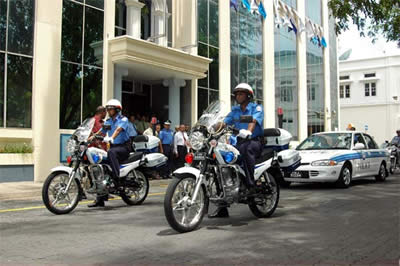
They are the same personnel operating out of the same premises.
Only the uniforms and paint on vehicles have changed. However the
newly formed Maldives Police Service does not have the power of
arrest outside Malé. The metamorphosis of the boys in khaki
into the boys in blue is an adventure without a legal framework
 The
history of civilian police in the Maldives goes back a long
time. In the glorious pre-Islamic period an office called
Fithunaayaka (later called Fennaa) existed.
The Fithunaayaka was the Chief Constable. Until the
1940s, civilian police constables were called Bandeyri-beykalun.
A uniformed police unit called Fuluhun, under the
Ministry of the Interior, was first established in the late
1940s but was later transferred within the jurisdiction of
the Department of Public Safety and merged with the National
Security Service.
Traditionally the power of arrest was vested in the Minister
of the Interior (later called the Minister of Home Affairs)
and was devolved to the Avarhuverin (Municipal Ward
Chiefs) of Malé and the Atoluverin (Atoll
Chiefs) of the atolls. The office of the Malé Avarhuverin
was abolished in the 1950s and the power of arrest was passed
on to the Municipal Council of Malé. The Municipal
Council was abolished in the early 1960s and the power of
arrest in Malé became vested in the Minister of Home
Affairs and gradually transferred to the National Security
Service. In time, the power of arrest of the Minister of Home
Affairs became an anachronism which existed only on paper
and exercised in practice by the Minister of Public Safety.
One of a series of laws passed on the day the Maldives reverted
to a republic specifically delegated the power of arrest to
three separate authorities. |
 The metamorphosis: boys in khaki become boys in blue
The metamorphosis: boys in khaki become boys in blue
Archbishop Desmond Tutu once remarked
about a change of Presidents in South Africa. "We had P.W.
before and now we have F.W." At that time the Apartheid regime
in its death throes was desperately trying to project a civilised
image to the World. It was hoped that F.W. de Clerk, who replaced
P.W Botha, would provide a human face to a vilified system. Tutu
was implying that de Clerk was just old wine in a new bottle.
The Maldives Police Service,
which was previously administered by the Ministry of Defence and
National Security as a paramilitary unit has become a civil authority
and is now administered by the Ministry of Home Affairs. This was
announced at a ceremonial function on the 1st of September
2004.
Interestingly, there is no specific
legislation in the Maldives such as the Police and Criminal Evidence
Act 1984 (UK), the Police Act 1958 (NZ), the Australian Federal
Police Act 1979 (Cth), or the Royal Canadian Mounted Police Act
that gives the Maldives Police Service the power of arrest, search
and seizure.
In the absence of any such legislation the Maldives Police Service
derives power of arrest from a general Act of parliament. Section
6 of General Laws enacted on 11 November 1968 (Law No. 4/68-Javiyani)
states:
In the event a person
is suspected of contravening orders of the Shariah or the State,
or a person is deemed unfit to be left at large owing to him or
her being suspected of creating a danger to the public, the discretion
to arrest that person, without causing any harm to him or her,
is vested in the Ministry of Defence and National Security, the
Ministry of Home Affairs in Malé, and the Ministry
of Atolls Administration in the atolls. [Our
emphasis added. The Ministry of Atolls Administration is now called
the Ministry of Atolls Development]
 Alo, alo, alo! Men and women of the Maldives Police
Alo, alo, alo! Men and women of the Maldives Police |
This section effectively provides
that the Ministry of Defence and National Security has the power
of arrest anywhere in the country, whereas the jurisdiction of the
Ministry of Home Affairs and the Ministry of Atolls Development
(in terms of power of arrest) is restricted to the capital, Malé,
and the atolls respectively.
When the Ministry of Defence and National Security administered
the Police Service, police officers were acting as delegates of
the Minister of Defence and National Security and therefore had
the power of arrest anywhere in the Maldives.
Following the change of administration of the Police Service from
the Ministry of Defence and National Security to the Ministry of
Home Affairs on the 1st of September 2004, the police officers now
act under the delegation of the Minister of Home Affairs. Since
the Ministry of Home Affairs does not have jurisdiction (in terms
of power of arrest) in the atolls, the police officers now do not
have power of arrest in the atolls.If
a police officer arrests a person in an atoll without a written
warrant from the Ministry of Atolls Development or a court of law,
the officer will be acting ultra vires.
If a police officer is required to arrest someone in an atoll, the
officer has to act under the delegation of the Minister of Atolls
Development because that is the only civil authority that has power
of arrest in the atolls under current legislation. As police officers
are not employed by the Ministry of Atolls Development and do not
have the delegation to perform functions of that ministry, any officer
required to make an arrest in an atoll will have to obtain a written
warrant from the Ministry of Atolls Development or a court of law.
If a police officer arrests a person in an atoll without a written
warrant from the Ministry of Atolls Development or a court of law,
the officer will be acting ultra vires. The officer will
have to be suspended from all duties and the offence will have to
be investigated by a competent complaints authority. The officer’s
actions should also be subject to judicial review by the High Court.
 Censorship of mail is now a Police function. This image shows
a Thaana inscription ("sensaru") by a Maldive
postal censor on the cover of a civilain mail item sent abroad
by Post during World War II
Censorship of mail is now a Police function. This image shows
a Thaana inscription ("sensaru") by a Maldive
postal censor on the cover of a civilain mail item sent abroad
by Post during World War II |

4 September
2004
UK police warn wife of Maldives
policeman over threat
On 15 September 2006 the British online newspaper Telegraph.co.uk
reported that "British police have issued a warning
to the wife of the most senior policeman in the Maldives
after an expletive-laden death threat to a Maldivian pro-democracy
campaigner living in the UK was traced to her e-mail address."
>>read
more
|
Most
of the graphics on this page are adapted from Haveeru Online |





 rss feed
rss feed 


 The
history of civilian police in the Maldives goes back a long
time. In the glorious pre-Islamic period an office called
Fithunaayaka (later called Fennaa) existed.
The Fithunaayaka was the Chief Constable. Until the
1940s, civilian police constables were called Bandeyri-beykalun.
A uniformed police unit called Fuluhun, under the
Ministry of the Interior, was first established in the late
1940s but was later transferred within the jurisdiction of
the Department of Public Safety and merged with the National
Security Service.
The
history of civilian police in the Maldives goes back a long
time. In the glorious pre-Islamic period an office called
Fithunaayaka (later called Fennaa) existed.
The Fithunaayaka was the Chief Constable. Until the
1940s, civilian police constables were called Bandeyri-beykalun.
A uniformed police unit called Fuluhun, under the
Ministry of the Interior, was first established in the late
1940s but was later transferred within the jurisdiction of
the Department of Public Safety and merged with the National
Security Service.

